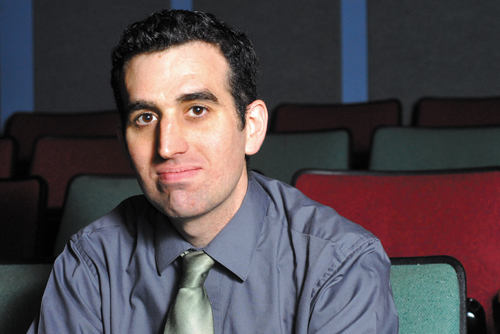Study analyzes sociological factors affecting actors’ chances of receiving an Oscar nomination

Sociology Professor Gabriel Rossman co-wrote a study on various sociological factors, including social networks and star power, that help determine which actors are nominated for the Academy Awards.
By Catherine Flanagan
Feb. 28, 2010 10:15 p.m.
With Oscar night fast approaching, red carpets will fill with stars and fans with stars in their eyes. Only one can win the coveted award, and the competition for nominations can be solid.
As Gabriel Rossman, an assistant professor of sociology, shows in a recent study, certain factors increase an actor’s chance of receiving a nomination.
Rossman first came up with the idea for the study while attending Princeton with one of its co-authors, Nicole Esparza, a USC assistant professor.
“We had this class on social networks where we had to write a term paper,” Rossman said. “What people usually do with social networks is basically just describe the structure, but what we wanted to do was hook it to some kind of outcome. So we thought (what) could be interesting would be to take the Internet Movie Database as a data set and predict based off of this who got nominated for an Oscar.”
Rossman and his two co-authors, Esparza and UCLA Professor Phillip Bonacich, used IMDB to look at the 20,000 movies released from 1936 until 2005. Rossman’s team proceeded in narrowing the list to the top 10 recognized major motion pictures released in a given year.
Esparza, who spent more than 100 hours researching in the Academy Film Archive, helped determine what films were recognized as the top 10 releases for every year.
“I went to the academy itself and actually read all their lists of movies that were considered eligible films,” Esparza said. “I also read their casts and relevant information on how they did their balloting from 1930s till the present.” From this, the team narrowed its study to about 150,000 acting performances, in which they focused on the Best Actor, Best Actress, Best Supporting Actor and Best Supporting Actress nominations.
“There were two issues we found that really interested us,” Rossman said. “One issue was who was a movie star and with whom you were working.”
They measured star power based on the film credits, where they saw actors were listed in order of importance.
“But instead of just looking at the ranking order of the credits in just one movie, we constructed a social network out of all of the movies within the last five years rolling,” Rossman said, from which they created a star power pecking order of Hollywood. “By looking at the social network of star power, it turns out that that is a very good predictor for who gets nominated for an Academy Award.”
Jonathan Kuntz, visiting associate professor and film historian, said he thinks that star power alone does not guarantee nominations. “Obviously they are looking for what they think would be considered the best performances by actors, and that usually involves characters that are outrageous, powerful or very strong,” Kuntz said. “Also, it seems like the academy likes to nominate people who are stretching roles … for instance, with Sandra Bullock (who is nominated for her role in “The Blind Side”) to a degree this year. She is not known as a great actress, but more of a Hollywood star who finally, after a career of almost 20 years, got a stretched role that people are not as used to.”
Rossman also looked at whether actors could benefit from others’ talent or star power.
“The second thing the paper did is what I think is a little bit more interesting,” Rossman said, regarding factors that increase the likelihood of nomination. “Actors are going to look good when they work with talented people. The technical word for this is “˜spillovers.’ This is an interesting thing since you tend to get talented people working with other talented people, meaning that people will end up looking even better than when just working alone.”
Rossman pointed out that his study only showed associations from past years.
“This is all probability. It’s not that getting nominated as a no-named actor never happens,” Rossman said. “However, the odds of getting nominated if you are an average actor working with an average writer and director are less than 1 percent. … Usually when the acting nominations come out, you have heard of most of the names nominated, which is consistent with what we found in our research.”

